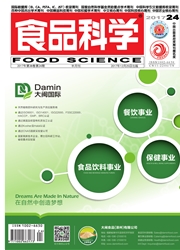

 中文摘要:
中文摘要:
利用核磁共振技术CPMG序列测定自旋.自旋弛豫时问Tz及其相应的质子密度A21、A22检测17种谷物在室温下的储藏过程中核磁共振驰豫参数的变化规律。研究结果表明,随着储藏时间的延长,弛豫时间对应的质子密度呈现下降的趋势,储藏到3~4个月,出现明显的下降;不同谷物在磁共振上的表现明显不同,可以将17种谷物划分为三类,即耐储藏谷物、较耐储藏谷物和不耐储藏谷物。该项技术快速、无损和对样品没有要求,研究结果可以为食品实际工业生产提供一定的理论指导。
 英文摘要:
英文摘要:
The spin-spin relaxation time T2 and its proton density A22 and A22 of 17 kinds of grains were measured by the NMR CPMG sequence at room temperature. The results showed that A2 has a continually decreasing tendency with the storage time increasing. And until 3-4 months it shows the obvious decrease. Different grains have the different characters on NMR, so the grains are devided into three kinds, namely the grains of longest, longer and long period. The NMR technology has the advantages of rapidity, no destruction and no demands on sample. This reseach may provide the theoretical guide for food industry.
 同期刊论文项目
同期刊论文项目
 同项目期刊论文
同项目期刊论文
 期刊信息
期刊信息
